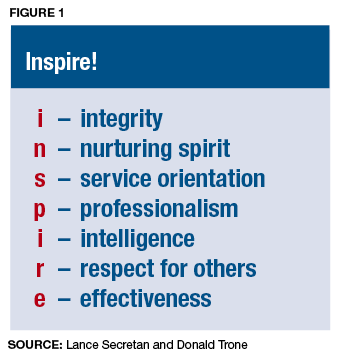I've been speaking about fiduciary responsibility for more than 25 years. When I give presentations, someone from the audience often comes forward and says something like, "Great speech, but you scared the daylights out of me."
I'm not going for a fiduciary version of the prison documentary Scared Straight! I'm going for something else, and that something else-the word that best describes my objectives-has eluded me until this summer.
In May, I met with Marv Tuttle and Paul Auslander of the Financial Planning Association to discuss a new leadership training program we are developing for the financial services industry. Marv took one look at our approach and said I needed to connect with the leadership and motivational speaker Lance Secretan. Marv felt he and I were cut from the same cloth.
I traveled to Canada in July and went through a three-day coaching program with Lance. The pivotal moment came early the first day when he defined leadership as the ability to inspire others. That was it. "Inspire" was the word I had been searching for.
Think of the people who have been the leaders and role models in your life-teachers, coaches, bosses, co-workers, relatives and spiritual advisors. What did they all have in common? It's likely they were all inspiring, each in his or her own way. They didn't have to project the presence of John Wayne, sing like Adele or throw a football like Peyton Manning to have made a positive, lasting impression on you.
Lance spoke about the differences between motivation and inspiration. He defined motivation as something we do to other people. When we motivate people, we are attempting to control their behavior and often to serve our own purposes, not theirs.
We do so by either making them fear punishment or offering them the promise of reward. Fear, greed and the needs of the ego are the forces driving much of the activity on Wall Street, and these are all forms of negative motivation. Regulations are, too, because you must comply with them or face the possibility of paying fines or even losing your right to work in the financial services industry. And motivation always comes with a price: When it is about "me" at the expense of "you," the result is often resentment, lack of trust and reprisal.
Inspiration is the opposite. While motivation is extrinsic, inspiration is intrinsic-the source of the essential elements that determine the quality of a relationship. If you really want to make a positive change in the world, it must come about through inspiration, not motivation. Once again, think about Wall Street. Is there anything inspiring about it today?
This leads us to the fallacy of the current fiduciary debate. A uniform fiduciary standard of care with more rules and regulations will not have a meaningful, positive impact on the industry, and it certainly will not help restore the public's trust. Since the creation of man and woman, history has demonstrated an inverse relationship between rules and behavior-adding more of the former has never improved the latter. There is no intrinsic value to Dodd-Frank; it is an attempt to control inappropriate behavior through negative motivation, and it will come at a steep price.
In order to restore the public's trust in our industry, financial advisors should be willing to take leadership roles in their clients' lives-to be a source of inspiration to help clients make moral, ethical and prudent decisions. And the best part is that we don't need an act of Congress, a budget or a self-regulatory organization to do that. It requires only a commitment on the part of each and every financial advisor to become a better leader and steward.

Lance's leadership model focuses on three elements-"destiny," "character" and "calling."
Destiny:This is your sense of purpose in the world, shaped by external forces. For example, if you are concerned about whether the average worker is going to be able to retire, you might decide to devote more of your time and resources to support 401(k) plans.








